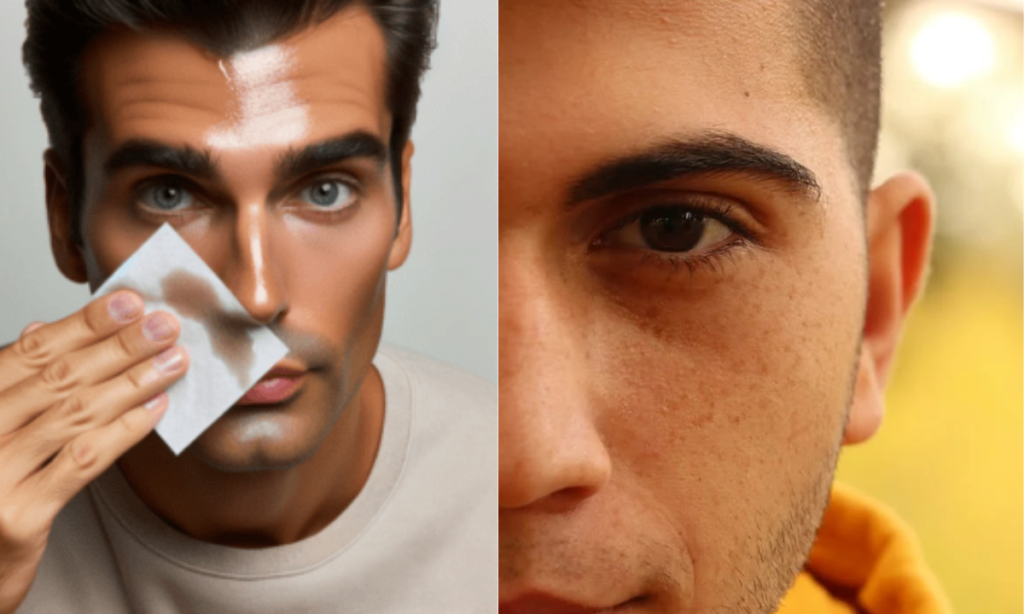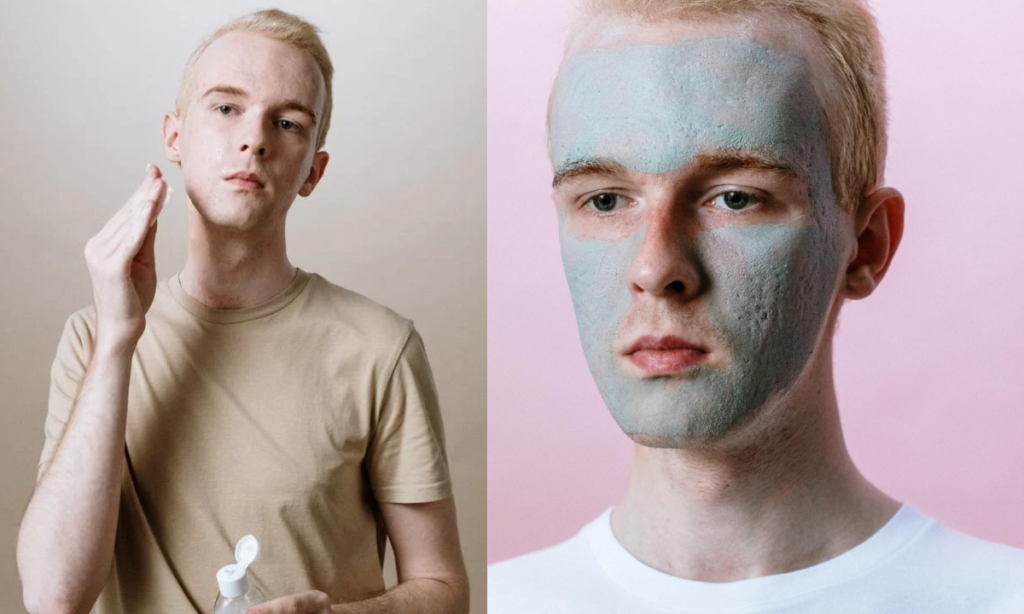Over the past few years, there has been an immense rise in the interest of men’s skincare. Many men today realize that it is vital to maintain healthy and glowing skin. New 2025 products and techniques come in a series, specifically for men. Be it a beginner or a skincare aficionado, this guide is filled with action-driven tips, advice, and real-life examples that will help you craft the perfect skincare routine. Let’s get into how you can achieve and maintain great skin.
Knowing Your Skin Type
Understanding your skin type is the most important thing you need to do before embarking on your skincare journey. It will help determine which products and routines are the best for you.
How to Identify Your Skin Type

Oily Skin: If your face feels greasy and shiny, especially in the T-zone- forehead, nose, chin-you most likely have oily skin.
Example: John, 25 years old, would often wake up to acne breakouts and an oily shine by midday. He learned he had oily skin after seeing a dermatologist.
Dry Skin: If your skin feels tight, flaky, or rough, especially after washing, you probably have dry skin.
Example: Mike, a teenager, suffered from extreme dryness during winter. He applied a hydrating moisturizer and saw a great improvement in his skin.
Combination Skin: It has oily and dry patches combined, often oily T-zone and dry cheeks.
Illustration: Alex, 30, did not find the right skincare. When he found his combination skin, he applied different treatments to the respective areas.
Sensitive Skin: You have sensitive skin if your skin is sensitive to products or environmental factors, reddening or irritating easily.
Example: Sam, 22, experienced redness and irritation with most products. Changing to fragrance-free and mild formulations was helpful.
Normal Skin: A balanced skin type with very few problems is termed normal skin.
Example: David, 28, had minimal concerns but still maintained a simple routine to keep the skin healthy for a long time.
Building the Ideal Men’s Skincare Routine

Daytime Routine
Cleansing: Begin with a mild cleanser to get rid of surplus oil and debris.
Tip: Use warm water instead of hot water to not strip off natural oils.
Product Recommendation: An all skin type gentler foaming cleanser
Toning: Applying a toner that may clean and balance a face’s pH for further solutions
Tip: Seek alcohol-free toners; otherwise, irritation can be caused.
Example: Tony, 27, of improved hydration and reduction in pore sizes.
Serum: Applying serums that target particular problems, be it hydrating or anti-aging serums.
Tip: Serums with antioxidants, Vitamin C, can be applied to offer stronger protection.
Case Study: There was a study that proved the use of Vitamin C serums in men reduces fine lines and wrinkles significantly in three months.
Moisturizing: Use a moisturizer that suits your skin type. Moisturize your skin with it.
Tip: For oily skin, a lightweight, oil-free moisturizer is recommended.
Sunscreen: Use sunscreen with a minimum SPF 30 to avoid UV damage.
Tip: Cloudy days may not harm, but UV rays can still affect your skin.
Example: Jake, 35, never used sunscreen but had premature wrinkles. His skin texture became better with daily sunscreen application.
Night Time Regimen
Cleansing: Cleanse off the dirt and oil of the day with a cleanser.
Tip: Double cleansing is effective, especially when you wear makeup or heavy sunscreen.
Exfoliating: Apply chemical or physical exfoliant 2-3 times a week to remove dead skin cells.
Tip: Over-exfoliation can cause irritation.
Example: After adding exfoliation to his routine, Chris, 21, saw fewer blackheads and smoother skin.
Treatment: Apply targeted treatments like retinoids or acne medications.
Tip: Introduce retinoids gradually to avoid irritation.
Case Study: A group of men using retinoids reported significant improvements in skin texture and reduced acne over six months.
Moisturizing: Use a slightly richer moisturizer at night to aid skin repair.
Eye Cream: Apply a small amount of eye cream to reduce dark circles and puffiness.
Tip: Use your ring finger to gently pat the product into the skin.
Example: Mark, 40, observed fewer fine lines around his eyes after he added an eye cream.
Teenagers’ Skincare Tips

Keep It Simple: A basic routine of cleanse, moisturize, and apply sunscreen is a good place to start.
Acne Products: Salicylic acid or benzoyl peroxide products can be applied for breaking out skin.
Application: Liam, now 16 years old, had his acne greatly reduced when he began using a salicylic cleanser.
Not Harsh Products: Non-comedogenic, gentle products will prevent irritation.
Consistency pays: Skincare results usually take time.
Case study: Six weeks of a persistent skincare routine among teenage boys resulted in clearer skin.
Hydration: Drink plenty of water to maintain healthy skin overall.
Advanced Men’s Skincare Tips

Incorporate Masks: Use hydrating or detoxifying masks weekly.
Facial Oils: Add facial oils for extra hydration and nourishment.
Professional Treatments: Consider treatments like chemical peels or laser therapy for more significant concerns.
Diet and Lifestyle: A balanced diet rich in antioxidants supports healthy skin.
Example: Ethan, 29, experienced clarity in his skin after cutting back on sugar and drinking more water.
Schedule Follow-up: Make an appointment with a dermatologist for a consult and follow-up.
Success Stories in Real Life
Case Study: Tom’s Makeover
Introduction: Tom, 33 years old, did not pay attention to his skin for years. He had patches of uneven tone and signs of aging.
Ritual: After a scheduled ritual of cleaning, moisturizing, and using sunscreen, a weekly exfoliant, and serum, Tom noticed great results.
Result: In just three months, Tom’s skin had become much smoother, better hydrated, and much younger.
Case Study: Men’s Skincare Success Story
Background: Ryan is a 15-year-old boy with the worst case of acne and oily skin a guy could ask for.
Routine: With the acne-targeted routine involving a salicylic acid cleanser, light moisturizer, and spot treatment, Ryan has clearer skin.
Result: Within six weeks, his self-confidence increased and his breakouts lessened.
ALSO READ: 10 Unique DIY Gift Ideas for Any Occasion
Conclusion
It’s only when there is consistency that healthy skin is achieved and sustained. Knowing your skin type and applying the right products and practices can make a big difference in how your skin looks and feels. Skincare is a journey, and results come with patience and consistency. For teenagers and adults alike, this guide provides actionable tips and real-life examples to help you get on your way to great skin in 2025 and beyond.
FAQ About Ultimate Guide 2025 on Men’s Skincare Routine
Q1: What are the simple steps of a men’s skincare routine?
The basic steps include cleansing, toning, applying serum, moisturizing, and using sunscreen during the day. At night, follow with cleansing, applying treatment products, and moisturizing.
Q2: How can I determine my skin type?
Your skin has its ups and downs during the day, too. It’s oily or greasy if it is shiny. If it’s tight and flaky, that’s a dry. Combination skin is an equal proportion of both, and it is sensitive if it easily reacts. Normal skin feels like the balance.
Q3: How often should one exfoliate?
One should exfoliate 2-3 times a week. Over-exfoliating can cause irritation in the skin.
Q4: Why sunscreen?
Sunscreen prevents the entry of destroying UV rays into the skin, leading to premature aging of the skin and also reduce the chance of getting cancerous skin. Use it every day, even on cloudy days.
Q5: Teenagers use the same skincare products that adults do?
Not really, as teenagers have their own products their skin requires- fighting acne products. Avoid anything harsh or comedogenic. Choose gentle non-comedogenic products.
Q6: What should I do if I have sensitive skin?
Use fragrance-free, gentle products and avoid harsh ingredients. Patch test new products and consult a dermatologist for tailored advice.
Q7: Are natural products better for the skin?
Natural products can be beneficial but ensure they are free from irritants. Not all natural ingredients are suitable for every skin type.

